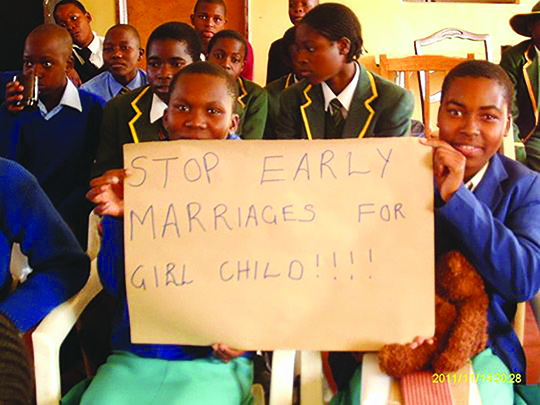Apostolic sect churches abusing girls
By Misheck Shambare
Thembi Kumire a mother of two in Chiweshe communal lands is a victim of the child marriage which she was forced to enter because of her religion and beliefs.

Kumire was born and raised in one of the apostolic sect churches known as Johane Marange, which has come under fire from the community for encroaching on women’s rights.
At the age of 14 she was forced to marry a 40 year old as per the church’s norms and values. This was despite the fact that the man was 26-years older than her and had two other wives as the church consents to polygamy.
According to the church’s tradition her parents have to support the marriage as girls should be married at an early age. When she was married to the old man, Kumire was doing form 2 and she was forced out of school. Now at the age of 18 she is a mother of two children.
“My parents did not consider that I was young to be married to a 40 year old man and to become a third wife but instead they accepted the bride price just because that is what the church doctrine stipulates.”
“I was taken out of school because my mother and father wanted me to get married to a man from our church. My husband is old that I do not know if he will be able to work and cater for my children’s education since he has more than eight children with his other wives,” lamented Kumire.
Child marriage remains widespread in rural areas, disproportionately affecting girls and endangering their lives and livelihoods. According to a survey by the United Nations, married girls are generally less educated, either for lack of opportunity or the curtailment of their schooling by early marriage.
“The idea of polygamy in the apostolic sects disadvantages women a lot since they will not be well catered for their needs and are deprived of their education since they get married at an early stage,” said one Tracy Chamboko from Chiweshe.
According to United Nations Children Education Fund (UNICEF) “State of the Worlds Children-2009” across developing countries on child marriage, an estimated one in three girls is married before turning 18, and one in nine before the age of 15. The report projects that if current trends continue; 142 million girls will marry before adulthood within this decade.
Rooted in cultural tradition and poverty, the practice not only violates human rights laws but also threatens stability and economic development.
International conventions prohibit child marriage and define eighteen as the age of adulthood.
These laws are based on the argument that children and adolescents are not mature enough to make choices about marriage, and that marrying too young can lead to lasting emotional, physical, and psychological harm.
Moreover, development experts say child marriage stunts girls’ educational opportunities and income-earning prospects, and perpetuate poverty in communities worldwide, inhibiting progress towards national and global development goals and threatening stability.
Delaying the age of marriage and investing in girl’s futures can have a multiplier effect that benefits the communities at large.
Surveys of child brides conducted by the United Nations and many nongovernmental agencies paint a broad demographic portrait of young married girls from rural areas are twice as likely to marry as children as those from urban areas.






